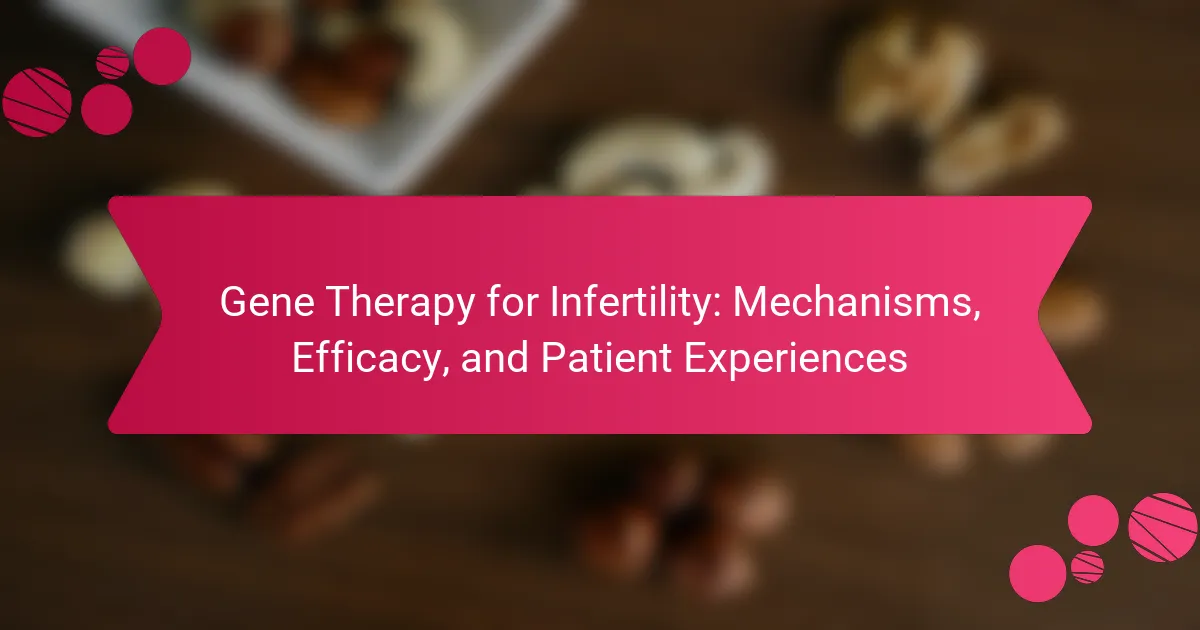Gene therapy offers hope for individuals facing infertility due to genetic causes by potentially correcting mutations that impair reproductive functions. This article explores the mechanisms behind gene therapy, its efficacy in clinical trials, and the emotional experiences of patients who have undergone treatment. It also addresses the unique challenges and ethical considerations associated with this innovative approach to fertility restoration.
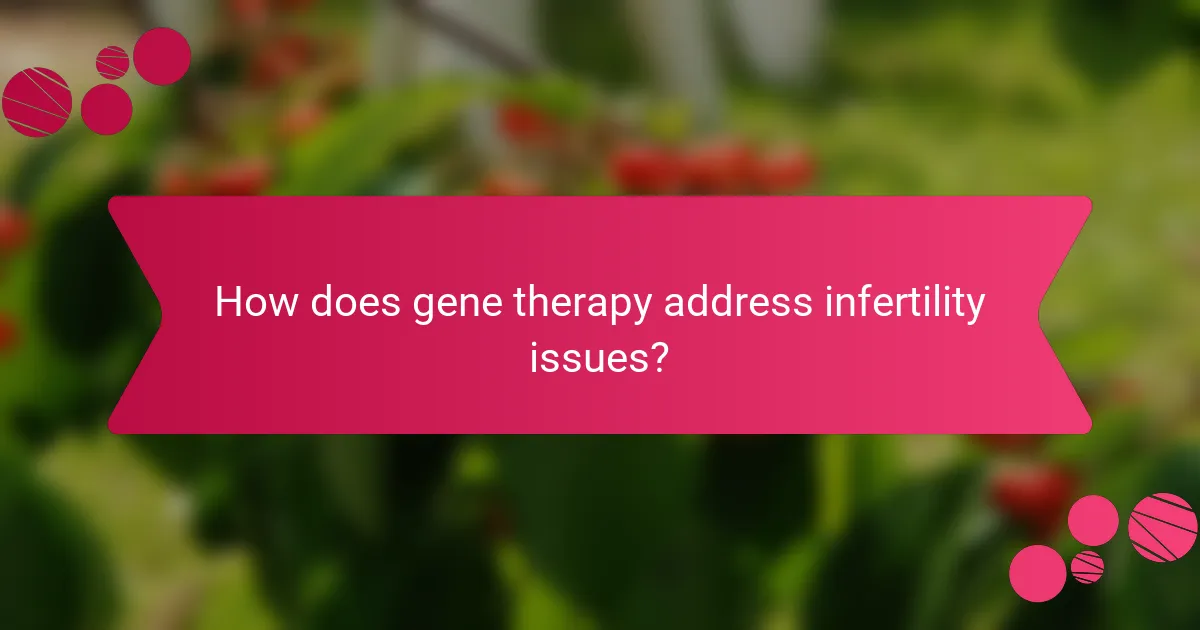
How does gene therapy address infertility issues?
Gene therapy addresses infertility by targeting genetic causes, potentially correcting mutations that impair reproductive functions. This innovative approach can restore fertility in individuals with specific genetic disorders. Recent studies show promising efficacy, with some patients experiencing successful conception post-treatment. Patient experiences highlight the emotional relief and hope gene therapy brings, transforming lives affected by infertility.
What are the underlying mechanisms of gene therapy in reproductive health?
Gene therapy in reproductive health addresses infertility through targeted genetic modifications and cellular interventions. It employs various mechanisms, including gene editing, gene replacement, and gene silencing, to correct genetic defects affecting reproductive functions. These approaches can enhance gamete quality, improve embryo viability, and restore hormonal balance. Recent studies show promising efficacy, with patient experiences indicating significant improvements in fertility outcomes.
Which genetic factors contribute to infertility that gene therapy targets?
Genetic factors contributing to infertility that gene therapy targets include mutations in specific genes, chromosomal abnormalities, and hormonal imbalances. These factors can disrupt reproductive functions, affecting sperm production or egg quality. For instance, mutations in the CFTR gene are linked to congenital absence of the vas deferens, impacting male fertility. Additionally, gene therapy aims to correct these genetic defects, potentially restoring fertility in affected individuals.
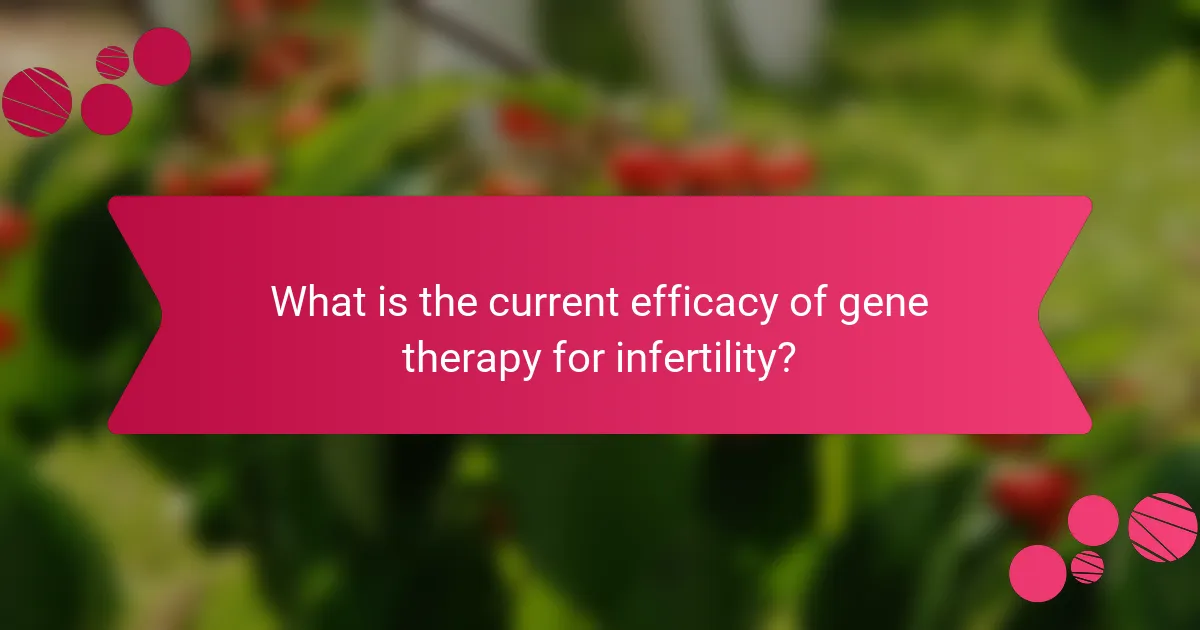
What is the current efficacy of gene therapy for infertility?
Gene therapy for infertility shows promising efficacy, particularly in genetic causes of reproductive issues. Current studies indicate that gene therapy can correct specific genetic defects, enhancing fertility rates in affected individuals. Clinical trials have demonstrated success in restoring normal function in cases linked to single-gene disorders. For example, therapies targeting mutations in genes like CFTR have shown positive outcomes in restoring reproductive capabilities. However, the field is still evolving, and long-term effects and broader applications are under investigation. Overall, gene therapy represents a significant advancement in treating infertility rooted in genetic factors.
How do success rates of gene therapy compare to traditional infertility treatments?
Gene therapy for infertility shows promising success rates compared to traditional treatments. While traditional methods like IVF have success rates around 40% per cycle, gene therapy can potentially exceed this by targeting specific genetic causes of infertility. Current studies indicate gene therapy success rates can reach up to 60% in certain cases, particularly where genetic abnormalities are identified. This innovative approach addresses underlying issues, offering hope for couples facing infertility challenges.
What clinical trials have demonstrated the effectiveness of gene therapy for infertility?
Clinical trials have shown gene therapy to be effective in treating certain infertility issues. For example, a trial published in the Journal of Clinical Endocrinology and Metabolism demonstrated that gene therapy improved sperm production in men with genetic defects. Another study in Molecular Therapy highlighted the potential of gene therapy in correcting hormonal imbalances that affect fertility. These trials indicate that gene therapy can address specific infertility causes, enhancing reproductive outcomes.
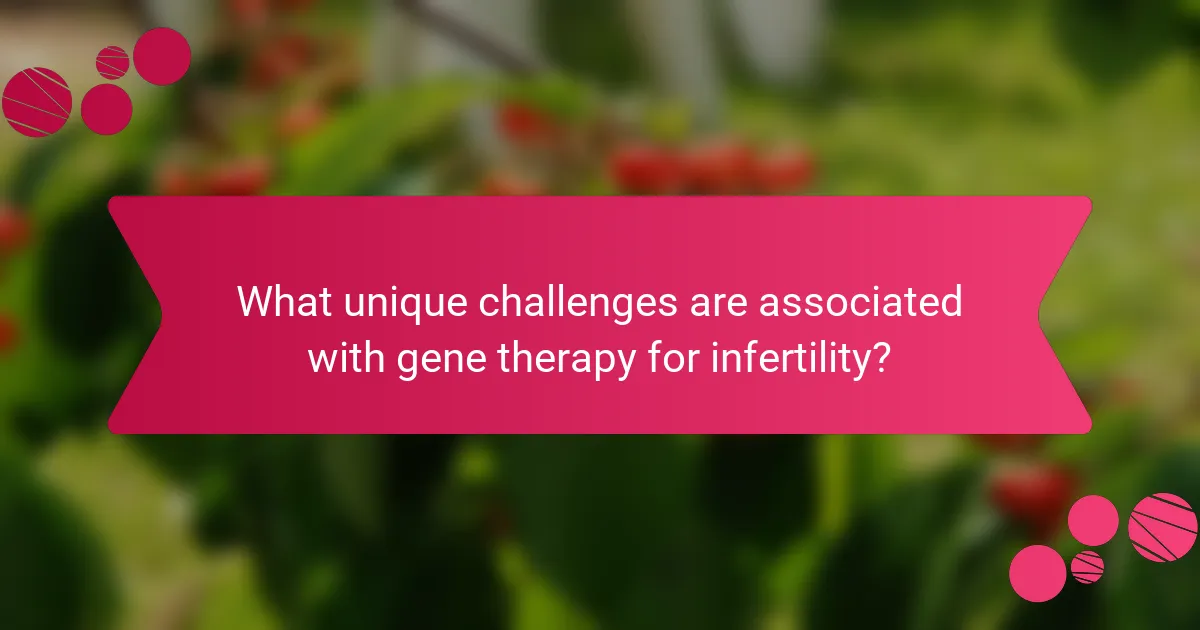
What unique challenges are associated with gene therapy for infertility?
Gene therapy for infertility faces unique challenges including ethical concerns, delivery mechanisms, and potential off-target effects. These issues complicate the development and application of therapies aimed at correcting genetic causes of infertility.
Ethical concerns arise from the manipulation of human germline cells, raising questions about long-term implications and consent. Delivery mechanisms must ensure precise targeting of affected cells, which remains a technical hurdle. Off-target effects can lead to unintended genetic modifications, posing risks to patient safety and treatment efficacy.
Additionally, the variability in individual genetic backgrounds complicates the generalizability of therapies. Each patient’s unique genetic makeup can influence treatment outcomes, necessitating personalized approaches. These challenges highlight the complexity of implementing gene therapy in infertility treatments effectively.
How do ethical considerations impact the development of gene therapy for infertility?
Ethical considerations significantly influence the development of gene therapy for infertility by shaping research protocols and clinical practices. These considerations include the potential for unintended genetic modifications, the implications of designer babies, and access equity. Researchers must navigate the balance between innovation and ethical responsibility, ensuring informed consent and prioritizing patient welfare. Additionally, societal attitudes towards genetic manipulation can affect funding and regulatory approval processes, highlighting the need for ongoing public discourse.
What are the potential risks and side effects of gene therapy in reproductive treatments?
Gene therapy in reproductive treatments carries potential risks and side effects, including unintended genetic changes, immune reactions, and ethical concerns. These risks may lead to complications in future pregnancies or affect offspring health. Monitoring and thorough evaluation are essential to mitigate these issues.
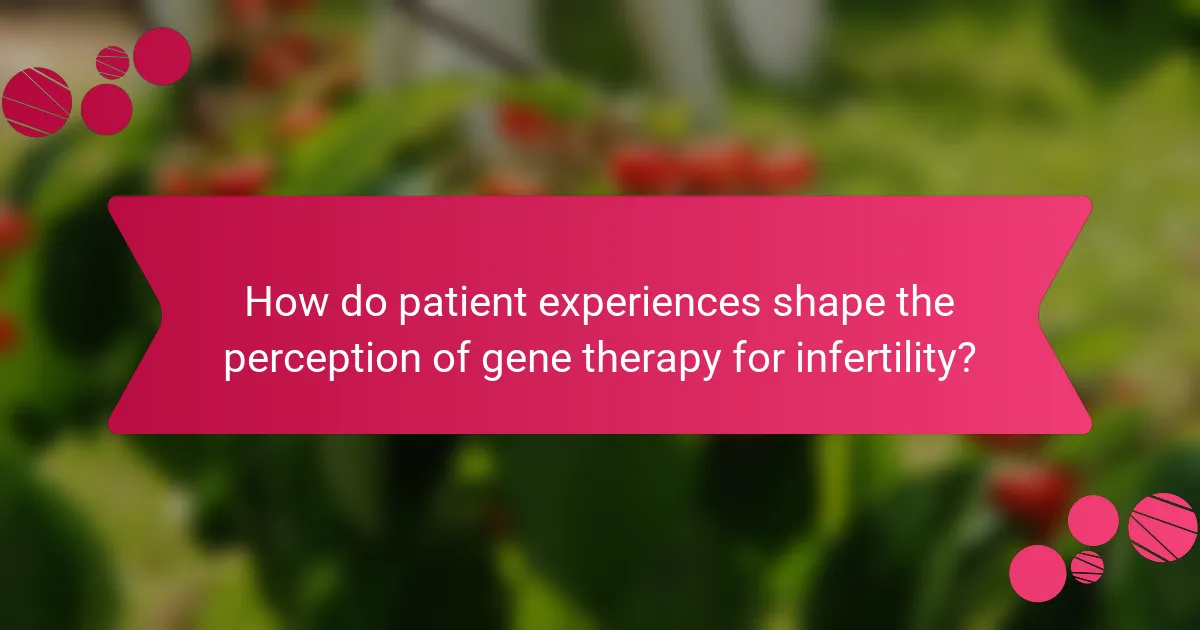
How do patient experiences shape the perception of gene therapy for infertility?
Patient experiences significantly influence the perception of gene therapy for infertility by providing real-life insights into its effectiveness and emotional impact. Positive testimonials can enhance trust and acceptance, while negative experiences may lead to skepticism.
Research indicates that patients who successfully conceive through gene therapy often report high satisfaction levels, which can enhance the therapy’s reputation. Conversely, those who face challenges may share concerns about the therapy’s reliability and safety.
Additionally, the emotional journey of infertility shapes narratives around gene therapy, as patients often seek hope and solutions. This emotional context can drive discussions and influence public perception, highlighting the importance of patient stories in shaping the future of gene therapy.
Ultimately, patient experiences serve as a vital feedback loop, informing both the medical community and prospective patients about the real-world implications of gene therapy for infertility.
What are common patient testimonials regarding gene therapy for infertility?
Patients commonly report positive experiences with gene therapy for infertility, highlighting its innovative approach and potential for successful outcomes. Many testimonials emphasize improved reproductive health and successful pregnancies. Patients appreciate the personalized treatment plans and the scientific advancements that gene therapy offers. Some share stories of overcoming previous infertility challenges, noting that gene therapy provided hope when other methods failed. Overall, testimonials reflect a growing optimism around gene therapy as a viable option for addressing infertility.
How do cultural attitudes influence patient acceptance of gene therapy for infertility?
Cultural attitudes significantly influence patient acceptance of gene therapy for infertility. Societal beliefs about genetics and reproductive technologies shape perceptions and willingness to adopt these treatments.
For instance, cultures with strong traditional values may view gene therapy as unnatural, resulting in skepticism or rejection. Conversely, societies that embrace scientific advancements may demonstrate higher acceptance rates.
Additionally, the stigma surrounding infertility can affect how patients perceive gene therapy. In cultures where infertility is heavily stigmatized, patients may feel pressured to seek solutions, increasing their acceptance of innovative therapies.
Ultimately, understanding these cultural dynamics is essential for healthcare providers to effectively communicate the benefits and address concerns related to gene therapy for infertility.
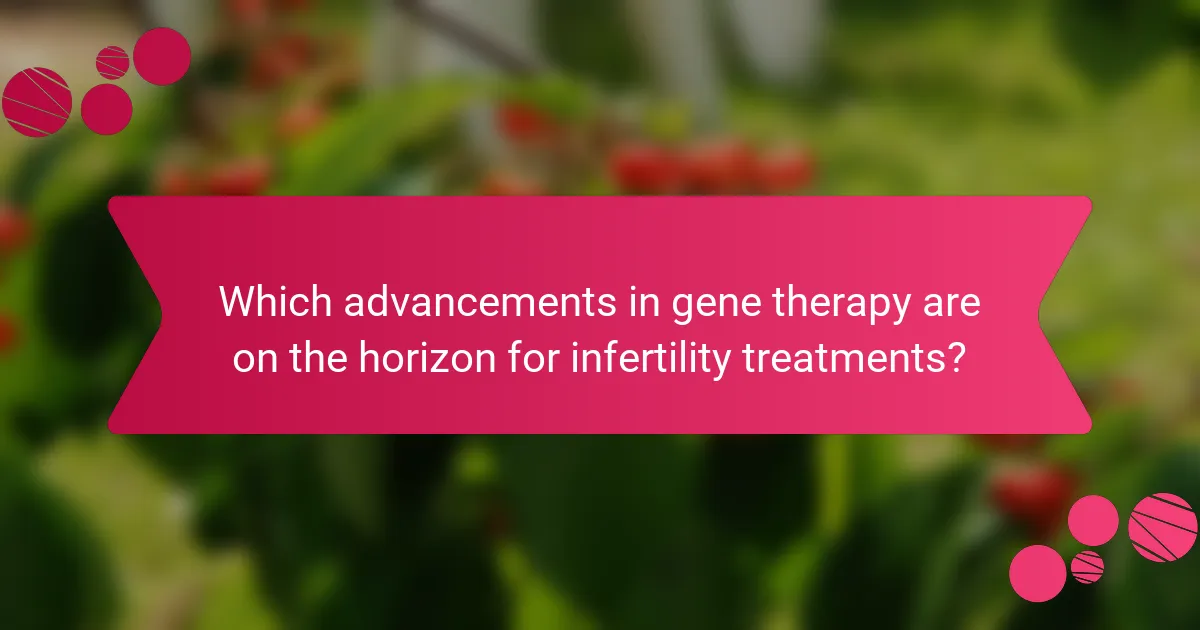
Which advancements in gene therapy are on the horizon for infertility treatments?
Advancements in gene therapy for infertility are promising, focusing on targeted treatments and personalized medicine. Researchers are exploring CRISPR technology to correct genetic defects affecting fertility. Additionally, advancements in stem cell therapy aim to regenerate reproductive tissues, enhancing fertility options. Clinical trials are underway to assess the efficacy of these therapies, with early results indicating potential success in restoring fertility in previously untreatable cases. As these innovations progress, patient experiences are being closely monitored to refine treatment protocols and improve outcomes.
What innovative techniques are researchers exploring in gene therapy for infertility?
Researchers are exploring innovative techniques in gene therapy for infertility, focusing on CRISPR-Cas9, gene editing, and stem cell therapies. These methods aim to correct genetic mutations causing infertility and enhance reproductive health. CRISPR-Cas9 offers precise modifications, potentially increasing success rates in assisted reproductive technologies. Additionally, stem cell therapies are being investigated for their ability to regenerate reproductive tissues and improve gamete quality. These advancements could transform infertility treatments, providing new hope for affected individuals.
How might future regulations affect the availability of gene therapy for infertility?
Future regulations may limit access to gene therapy for infertility by imposing stricter approval processes and safety standards. These changes could delay the availability of new treatments, impacting patient options. Regulatory bodies are likely to prioritize safety and efficacy, which may lead to increased costs and longer development timelines. As a result, patients might face challenges in accessing innovative therapies that could enhance reproductive outcomes.
What best practices should patients consider when exploring gene therapy for infertility?
Patients exploring gene therapy for infertility should consider several best practices. First, consult with a fertility specialist experienced in gene therapy. Understand the specific genetic factors affecting infertility and how gene therapy may address them. Evaluate the efficacy and risks associated with the therapy, including potential side effects. Seek information from credible sources and patient testimonials to gauge experiences. Finally, discuss financial aspects, including insurance coverage and out-of-pocket costs, to make informed decisions.
